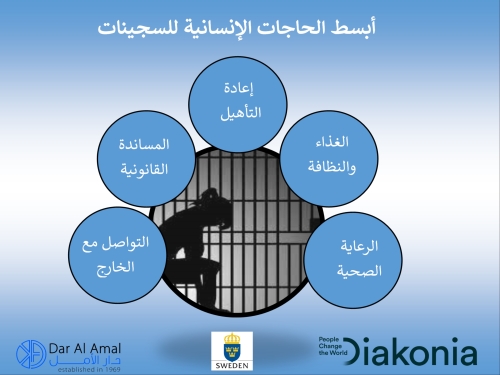Project: “Promoting
the Human Rights of vulnerable women through social rehabilitation and
reintegration project, addressed to all imprisoned and released women in three
women prisons in Lebanon”
In partnership with
Diakonia
Duration: 3 years: From 1st of Jan 2023 to 30
Dec 2025
Geographical
Location: Three Women
prisons in Lebanon (Baabda – Tripoli - Zahle)
Project Summary
The project aims to do a positive change in promoting the rights of all
the women imprisoners during their stay in the prisons and after their release.
Most of the imprisoners belong to very, poor families. They are vulnerable,
living in very difficult conditions in the prisons. The project will implement
right-based and gender sensitive services of social rehabilitation and
reintegration for the imprisoned and released women. Through the provided
services, the project would contribute to their empowerment and the improvement
of their living conditions inside the prisons and after their release.
Advocacy through Dar Al Amal
social media platforms will be a major component of the project aiming at
ensuring the rights of these marginalized women in living with dignity inside
and outside the prisons. Until now, the responsibility of the prisons is under
the Interior Ministry, and could not be moved until now to the Justice Ministry
as it was decided seven years ago. Since beginning 2020, very rare NGOs who
have permit to enter the women prisons entered regularly to the prisons. No
more collaboration in ensuring the basic needs of the prisons and the
imprisoners.
Dar Al Amal
in partnership with the Ministry of Social Affairs, Diakonia and with the
support of the civil society, is still ensuring most of the basic needs of the
three women prisons, and the support at all levels to the imprisoners and to
the released women. In parallel, efforts will be done to do pressure for the
amendment of the prison system, established in 1949, and amended in 1977. The
project is implemented by a multidisciplinary team from Dar Al Amal in the
three women prisons of Zahle (Bekaa), Tripoli (North Lebanon) and Baabda (Mount
Lebanon).
Objective: Promote
Human Rights and Gender Equality for marginalized and stigmatized women
Outcome: Imprisoned
and released women enjoy better access to quality services and improved their
mental, social and health wellbeing.
-
Output 1 : Imprisoned and released women are empowered
and acquire vocational skills
-
Output 2 : Imprisoned and released women have support to improve their
educational performance
-
Output 3: Imprisoned and
released women receive psychosocial support and medical and legal aid.
-
Output 4: Imprisoned and
released women have necessary tools and information to deal with conflict and
violence practices
-
Output 5: Public opinion is
aware of the situation inside the
women prisons
Activities:
1. Follow-up and support of
imprisoned and released women:
1.1. Individual
level: physical-medical, psychological,
legal and social assistance (Imprisoners and released)
1.2. Family
Level: Improving Relation with family, Supporting Children (imprisoners and
released)
1.3. Group
activities:
1.3.1. Education:
foreign language, literacy (for beginners, and advanced) and computer sessions.
1.3.2.
Awareness raising: basic living skills, health education, human rights
(imprisoners and released).Basic living skills
1.3.3.
Legal assistance
1.3.4.
Recreational and sports activities
2. Vocational
Training Sessions:
2.1. Vocational
training for inmates and released women:
2.1.1.
Embroidery, sewing, handicrafts, false jewellery, waitress training, mobile
maintenance, candles decoration.
2.1.2.Small
business management sessions
2.2. Training
sessions for prisons staff:
2.2.1.Sexually
transmitted disease and HIV/Aids, and the integration of VCT services in women
prisons.
2.2.2.Human
Rights policy and standards
3. Social
Reintegration of released women:
4. Support
to the released women:
4.1. Facilitating
access to economic activities and jobs
4.2. Ensuring
a shelter or home if needed.
4.3. Supporting:
physical-medical, psychological, social and legal.
4.4. Supporting
their Children: physical-medical, psychological, legal, educational and social
assistance
5. Income
generating projects :
5.1. Imprisoners
or released women become skilled after vocational training sessions.
They
work together in groups and produce together items which increase their household
income and the improvement in their standards of living
5.2. Marketing
their hand made products
6. Advocacy:
Raising awareness and highlighting the
situation inside the women prisons in order to sensitive the public opinion



